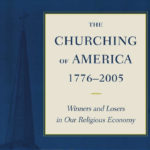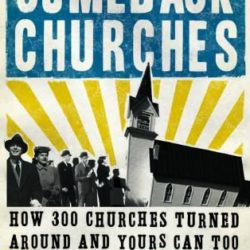By Pastor Joe Epley
Hot Rod Sunday could not have gone better. Seven hundred people crowded the church building for the morning service. Speakers set up in the parking lot relayed a timely Gospel message to a standing-room-only crowd of community members. The day continued with burnout competitions and drag races, complete with trophies and prizes. For the people of Princeton, Minnesota, Hot Rod Sunday would be remembered as a family friendly good time that everyone in town enjoyed. For Pastor Chuck Pruett and his congregation at New Life Church, this was becoming business as usual for the growing body of believers.
Momentum. This word began to define Pastor Chuck’s church not long after his arrival in 1997. Chuck had spent the last 10 years of his ministry journey as a children’s pastor at a large Assembly of God church in Minnesota. While he found great success, he felt the Lord’s call towards being a lead pastor, and approached his district superintendent for some guidance. His superintendent opened his eyes to see what he called the “Ring of Fire”, representing dozens of small communities in a “ring” around the Twin Cities where God’s Spirit was doing amazing things. When he considered Princeton, a town of 4,200 with a dying church of just 26 members, Chuck jokingly commented “I had to pray about even praying about it.” However, the gentle tug and steady hand of the Lord led Chuck and his family to follow God’s call and begin pastoring the church.
Near death experiences have a way of putting things in perspective, and the Princeton Assembly of God church was no exception. Facing dramatically shrinking membership, the church was willing beyond all else to reach people, even if drastic change was necessary. This recognition of the need for change allowed Chuck to quickly establish a new mindset in the church. The strategy was simple: reach kids, then their families, and by doing so reach the community. This was the vision. This was the building block and foundation of why they would exist as a church and people began to respond almost immediately.
An afterschool program for elementary age kids quickly grew to 130 kids weekly. Sunday services followed suit. Each new event maintained the heartbeat. Harvest Festivals on an annual basis eventually drew crowds of over 1,600. Sunday attendance climbed steadily eventually reaching 900 consistent attendees. Hot Rod Sunday, an event reaching 700 members, both was and was not monumental. It represented, on one hand, an incredible bridge built with the community and a wonderful Gospel presentation. However, what has not been surprising has been the prevalence of God’s blessing on the church as events like this take place in the community.
Growth such as this does not happen without a lesson attached. As we talked, Chuck spoke as much about the church itself as he did the leadership lessons the Lord taught him along the way. He began with this heartbeat:
“It is easier to raise a generation than it is to reach a generation.”
This model remains the DNA of New Life Church. The budget, staffing, event calendar and services are all geared towards effectively loving, winning, and discipling children. Chuck saw it happen more times than he could count. The kids would “drag their parents to church” and then grandparents visiting the church on Easter would stay too. This led to a multigenerational church with strong family ministries.
Sunday services became an extension of this drive. If the church itself existed to reach kids, Sunday services were going to be relentlessly centered around reaching today’s adults ages 28-42; the most likely demographic to have elementary age kids. The money showed the priorities, with every surplus amount flowing into kid’s and family ministry. Kids began to be utilized at every stage of development within the church. They began to serve as ushers, worship team members, leaders in various ministries, and event staff. This integrated approach helped kids remain grounded and connected in the local body and created a strong culture of leadership development within the church. Chuck mentioned with excitement that many of the pastors on staff were raised from within the church body instead of brought in from outside. The big picture of this church is one of incredible kingdom impact in their community.
In light of what God has done through the church, I asked Chuck something many pastors wonder: What’s the secret sauce? How does one reproduce this kind of spiritual and kingdom impact as a leader? What are the takeaways for other pastors? He shared a few common principles that may help with growth:
1) Hold vision close, hold everything else loosely.
The vision of reaching kids and families is the heartbeat of New Life Church. Beyond that, a culture of steady change is fostered. The goal of this is simple. Growing churches with good visions frequently stop growing because they become more focused on how something is being done versus the goal in mind. Instead of reaching families, a congregation settles for arguing about musical styles, refuses to abandon dead programs or events, or begins to let personal projects drain time, effort, and resources. Chuck said a key to the vision was a constant reevaluation of methods in order to reach the goal.
2) Create strong administrative structures.
This is the most BORING and incredibly useful detail in the whole interview. No one I know gets very excited about administrative structure. However, each new growth bracket, from 26 congregants to 900, necessitated the creation of strong administrative structures. New positions had to be prayed about and created based on where growth was going to be, not where it was at the moment.
Pastor Chuck guided the board through the process of becoming a vision driven church instead of a deacon driven church. This created a case where resources could be spent and used without having to jump through red tape and layers of committee approval, allowing the work to go forward quickly. Positions were added only when deemed absolutely useful or necessary, balancing the need for more workers with the availability of resources. The celebration of 1,600 harvest festival attendees resounded loudly from atop a foundation of administrative backbone.
3) Develop leaders. Seriously, just do it.
This seems like a no brainer. However, as Pastor Chuck spoke to me, it became clear that true leadership development is a highly intentional process that takes immense pastoral discipline to carry out. This does not mean it cannot be done anywhere; quite the opposite. It simply means many are not willing to undertake the task. Pastor Chuck delegated pastoral authority and then let those people have the freedom to run events or ministries without micromanagement. Strong leaders will usually be attracted to a church that allows for that kind of trust. He also began entrusting leadership roles to people being raised in the church, giving students as young as elementary age a stake in the church in some way that kept them around through adulthood. The culture of developing leaders is key to church growth in any context.
Growing churches sometimes appear to be like the Great and Terrible Oz in the Wizard of Oz. The impact they have for God’s kingdom can be so immense that it seems intimidating and impossible to approach. However, behind the curtain exist regular people, faithfully serving the Lord. Behind the curtain we often find people like Chuck Pruett, who have worked within God’s call and put into practice common principles that other churches can, and should do, in order to see growth.
Questions for Reflection:
- What is the vision of your church? Is it easy to define? Do your resources go towards your vision?
- What formats or “ways of doing things” need to change to accomplish God’s vision for your church?
- What administrative structures need to be written down, updated, fleshed out, or strengthened to make the vision possible?
- How are you engaging young people and families in church leadership?
- How are you as a pastor personally developing leaders in your church? Or, as a lay person, how can you take steps toward being developed as a leader?



















